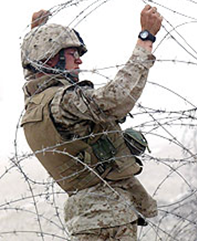Fear of anti-U.S. backlash spurred troops' pullback

The Bush administration's decision to pull back U.S. Marines from the brink of a major assault against Fallujah — and use Iraqi fighters in their place — is a calculated risk born of having few good options.
Some defense analysts say anger at the U.S. occupation is already so intense that an all-out assault against insurgents would risk spreading greater resentment across the country. Others fear that backing down from a confrontation with insurgents will be seen as weakness and will embolden guerrillas elsewhere in Iraq.
"To continue combat operations in Fallujah could cause us to win the battle but lose a significant amount of the willingness of the Iraqi people to support us going forward," says Joseph Hoar, a retired Marine general who commanded U.S. forces in the Middle East from 1991 to 1994. "You've got to find a political solution there."
A deal brokered Thursday will put former members of Saddam Hussein's military in charge of a force of 1,000 Iraqi soldiers who will fight the guerrillas with the backing of the Marines.
Since the U.S. occupation began a little over a year ago, the American-trained Iraqi security forces have performed poorly. So it is telling that the administration is now willing to entrust one of the most important battles of the war to an untested force whose loyalties are unclear. The soldiers would presumably include former members of Saddam's army.
The decision marks a stark reversal for top U.S. administrators in Iraq, who had purged senior members of Saddam's Baath Party from top government positions and disbanded the Iraqi army last year.
The reliance on a homegrown force to battle guerrillas recalls the 2001 war in Afghanistan, when the Pentagon used a small number of U.S. commandos to fight alongside the Afghan forces of the Northern Alliance army against the Taliban.
Michael Vickers, a military analyst at the Center For Strategic and Budgetary Assessments, says there is no question that the Marines could defeat the insurgents. But the price would probably be too high.
"The trouble is how it plays elsewhere. Even if it is surgical, and not a slugfest, it can be problematic."
Others say backing down will inevitably been viewed as a sign of cowardice. "It will be widely portrayed in Iraq and the Arab world as a tactical defeat of U.S. military forces," says Barry McCaffrey, a retired Army general who commanded forces in the 1991 Persian Gulf War. McCaffrey says a better option would have been to evacuate the city and send a heavily armed U.S. force in to kill the guerrillas.
Hoar disagrees. He insists that only Iraqis have any hope of restoring order there. "It is a tribal city, and no one can go in and run it without the support of tribal leadership," Hoar says. "Even Saddam was careful about buying off the leadership."